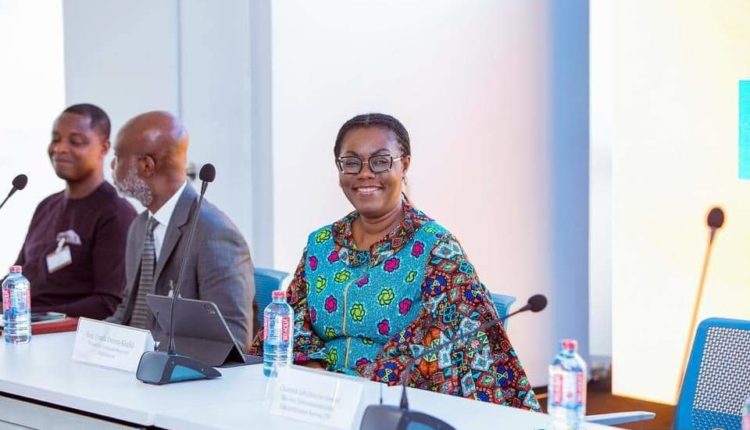The Ministry of Communications and Digitalisation has begun stakeholder engagement to better the country’s Digital Economy Policy for inputs that creates inclusiveness and comprehensiveness for all, the sector Minister, Mrs. Ursula Owusu-Ekuful has stated.
The draft policy she indicated is hinged on five pillars which include Digital Government, Data and emerging technologies, Digital Skills, Universal Access and Connectivity and Digital Entrepreneurship.
Under the Data and Emerging Technologies, the policy directions cover on Data governance, Emerging tech and regulation, Data classification, Data sharing and Open data.
“The effectiveness of Ghana’s digital transformation agenda is undergirded by a clearly defined digital policy and strategy. To this end, I delivered a keynote address at the ITU Academic Conference, Kaleidoscope Accra 2022. My ministry is currently leading stakeholder engagement efforts on Ghana’s draft Digital Economy Policy for inputs to ensure inclusiveness and comprehensiveness.
“Building advanced capabilities in data science and emerging technologies is an important part of the digital economy value chain. Our capacity development agency, the Kofi Annan Centre of Excellence in ICT (GI-KACE) has been at the forefront of training the next generation of Data Scientists and Ai professionals and advancing research for sustainable development. The aim of the Kaleidoscope conferences is to identify emerging developments in information and communication technologies (ICTs) and, in particular, areas in need of international standards to aid the sustainable development of our interconnected world” she made it known in a Facebook post after her address at the 14TH ITU ACADEMIC CONFERENCE KALEIDOSCOPE.
Addressing patrons at the main event on Wednesday, December 7, 2022, she called for strategic collaboration in the development of Extended Reality (XR) in Africa in order to harness its potential to the fullest.
She said in recent times the world has witnessed major advancements in emerging technologies in the Virtual, Augmented and Mixed realities which are being deployed increasingly in business and the more developmental areas of science, health and education.
She said especially, at a time research estimates the value of global digital economy to be $11.5 trillion, equivalent to 15.5 percent of global GDP and the pace of growth averages 2.5 times faster than global GDP over the past 15 years.
“Ghana has become a fertile ground for data science research and development with the entry of AI labs including Google’s first in Africa. These developments argue well sustainable research and create the right tools and environment necessary to develop AI solutions for Africa’s agriculture, health, education, and financial sectors. There has also been growing activity in the local technology ecosystem with Government, Development partners, corporate bodies, Venture Funds, Innovation Hubs, and other ecosystem enablers committing resources and starting initiatives.”
She added, “Abena AI and Nubian VR are recent local innovations among others, which give credence to the growth of ecosystem. NubianVR is developing learning content built-in WebXR. It’s focused on content based on curriculum needs and connectivity constraints of the school system in Ghana. Abena AI is a local Twi language voice assistant developed by Ghanaian start-up Mobobi.
“Building advanced capabilities in data science and emerging technologies is an important part of the digital economy value chain. Our capacity development agency, the Kofi Annan Centre of Excellence in ICT (GI-KACE) has been at the forefront of training the next generation of Data Scientists and Ai professionals and advancing research for sustainable development.
“Collaboration between Public, Private, Civil society, Academia/Industry for joint research & innovation projects as well as data and knowledge sharing partnerships among key stakeholders foster the joint discovery of solutions to common digital development challenges. It also promotes shared commitment and joint ownership of new digital policy and strategic direction.”
ITU Kaleidoscope Accra 2022
Themed: “Extended reality – How to boost quality of experience and interoperability”, Kaleidoscope 2022 is the fourteenth in a series of peer-reviewed academic conferences organized by ITU to bring together a wide range of views from universities, industry and research institutions.
The aim of the Kaleidoscope conferences is to identify emerging developments in information and communication technologies (ICTs) and, in particular, areas in need of international standards to aid the sustainable development of our interconnected world.
“Ghana now fertile ground for Africa’s data science research” she added.
Touching on Ghana’s digitalisation agenda, Mrs. Owusu-Ekuful said there has been growing activity in the local technology ecosystem with Government, Development partners, corporate bodies, Venture Funds, Innovation Hubs, and other ecosystem enablers committing resources and starting initiatives.
“The effectiveness of a country’s digital transformation agenda is undergirded by a clearly defined digital policy and strategy”.


Comments are closed.